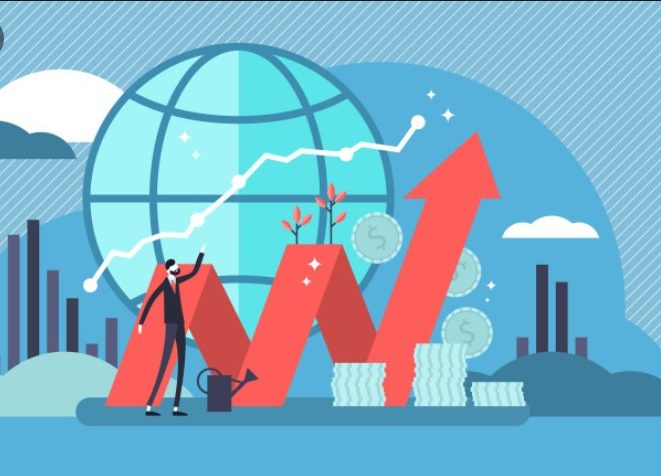The world economy is expected to grow by more than 5 per cent this year, but the recovery is dependent on a successful roll-out of Covid-19 vaccines across the globe, according to a new analysis.
Global gross domestic product (GDP) contracted a historic 3.7 per cent last year due to the impact of the coronavirus pandemic, but Moody’s Analytics has forecast a rebound of 5.4 per cent in 2021, upgrading its February estimate of 4.9 per cent.
Asia is expected to lead the recovery with growth of 6.9 per cent, fuelled by China’s rapid expansion and India’s turnaround.
However, the forecast is predicated on a successful global vaccine roll-out, Moody’s Analytics economist Shahana Mukherjee said.
Recovery will continue to be uneven across regions until cases across the world begin to subside and vaccine distribution picks up
“However, recovery will continue to be uneven across regions until cases across the world begin to subside and vaccine distribution picks up. In the current setting, Covid-19-related uncertainty has not diminished and may well lead to another phase of cautious decision making in the first half of this year.”
WATCH: Middle Income Trap: Why few escape? | Real Turkey
Fitch, too, is optimistic
Fitch Ratings also upgraded its global GDP growth forecast to 6.1 per cent this year from 5.3 per cent estimated late last year, on the basis that vaccinations would gain traction and GDP numbers were better than expected in the last quarter of 2020.
China will lead the pack with 8.4 per cent growth in 2021, up from 8 per cent in the previous forecast, while the US will grow at 6.2 per cent, up from 4.5 per cent. Emerging markets outside China are expected to do well at 6 per cent, while Europe’s growth forecast remains unchanged at 4.7 per cent, Fitch Ratings said.
“The pandemic is not over, but it is starting to look like we have entered the final phase of the economic crisis,” said Brian Coulton, chief economist at Fitch Ratings.
ING Economics has forecast global growth of 6 per cent for 2021, taking into consideration the world economy’s quick return to pre-pandemic levels of import-intensive activity, as well as the expected reopening of economies over the course of the year.
While coronavirus lockdowns devastated sectors such as tourism and consumer spending, the global trade of intermediate goods used in manufacturing and capital goods like machinery kept the global economy buoyant, ING senior economist Joanna Konings said.
The pickup in manufacturing will see mining-dependent economies remain the most resilient this year, while recovery in more tourism-reliant and oil-producing countries will instead be tied with the pace of global vaccinations, Mukherjee said.
While Asia is likely to continue its recovery and Latin America has been on the mend since late 2020, some European countries risk recession in the next few quarters, owing to “a largely conservative approach to easing restrictions”, Mukherjee said.
“Europe’s inoculation drive may slow down in the near term, as several countries oscillate in their decision to use the AstraZeneca vaccine following reports of serious side effects … the heightened uncertainty has followed recent news of supply shortages, which suggested that AstraZeneca was likely to fall short of its commitment of contracted vaccine doses for the second quarter,” she said.
Overall, Moody’s Analytics does not expect global “herd immunity” to occur before mid-2024.
WATCH: World economy tour with Erda Gercek
As for fiscal support, the Biden administration’s much larger-than-expected stimulus package of US$1.9 trillion is key, Fitch Ratings said. The package, which is more than 2.5 per cent of global GDP, will have an impact on world recovery, supported by fiscal relief in Britain, Japan, India and the European Union.
But global unemployment will continue to languish, both Moody’s Analytics and Fitch Ratings said.
Mukherjee expects global labour market recovery to lag the economic rebound in 2021 as job losses last year were severe and revival will take time, isolated to certain sectors like manufacturing rather than service industries like tourism. The more informal economies of Latin America and in parts of Asia will continue to struggle.
The eventual withdrawal of wages and other fiscal subsidies and any changes to the pace of vaccinations, which dictate the opening of borders, can have an impact on employment recovery.
Ultimately, despite a strong start to vaccinations, there are risks of another economic downturn due to resurgences of the virus and delays in deploying vaccines, Mukherjee says.
“Additionally, geopolitical risks will assume an important role in the post-Covid-19 recovery phase,” she said.
“Not only will the prolonged US-China tensions shape investor decisions, but evolving geopolitical dynamics among the large economies in the Asia-Pacific region can have significant ramifications on global trade and investment against the already-tense backdrop of technology and security-driven disputes and the larger rhetoric to reduce supply-chain dependencies on China.”
Follow our English language YouTube videos @ REAL TURKEY: https://www.youtube.com/channel/UCKpFJB4GFiNkhmpVZQ_d9Rg
And content at Twitter: @AtillaEng
Facebook: Real Turkey Channel: https://www.facebook.com/realturkeychannel/
